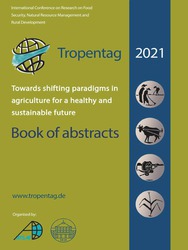| Areas | |
|---|---|
| Serie de libros (97) |
1382
|
| Nachhaltigkeit |
3
|
| Gesundheitswesen |
1
|
| Letra |
2376
|
| Ciencias Naturales |
5408
|
| Matemática | 228 |
| Informática | 320 |
| Física | 980 |
| Química | 1364 |
| Geociencias | 131 |
| Medicina humana | 243 |
| Estomatología | 10 |
| Veterinaria | 108 |
| Farmacia | 147 |
| Biología | 835 |
| Bioquímica, biología molecular, tecnología genética | 121 |
| Biofísica | 25 |
| Nutrición | 45 |
| Agricultura | 1005 |
| Silvicultura | 201 |
| Horticultura | 20 |
| Ecología y conservación de la tierra | 148 |
| Ciencias Ingeniería |
1798
|
| General |
98
|
|
Leitlinien Unfallchirurgie
5. Auflage bestellen |
|
Erweiterte Suche
Tropentag 2021 – International Research on Food Security, Natural Resource Management and Rural Development (Tienda española)
Towards shifting paradigms in agriculture for a healthy and sustainable future
Eric Tielkes (Editor)Previo
Lectura de prueba, PDF (73 KB)
Indice, PDF (35 KB)
Tropentag is the largest interdisciplinary conference in Europe on developmentoriented research in the fields of tropical and subtropical agriculture, food security, natural resource management and rural development. Normally, the Tropentag takes place annually. However, for reasons that by now have become obvious, the past two years have been particularly challenging. We are therefore, delighted that the University of Hohenheim managed to host a hybrid version of the conference from 15𝑡ℎ to 17𝑡ℎ September 2021. Being a hybrid conference, it was pleasing to note that people did not only gather in one of the lecture theatres at the University of Hohenheim but also in one of the state-of-the art seminar rooms at the Czech University of Life Sciences in Prague. The rest, of course, attended via Zoom meetings being streamed on YouTube channels using the Whova online platform.
| ISBN-13 (Impresion) | 9783736975736 |
| ISBN-13 (E-Book) | 9783736965737 |
| Formato | A5 |
| Idioma | Inglés |
| Numero de paginas | 562 |
| Laminacion de la cubierta | mate |
| Edicion | 1. |
| Lugar de publicacion | Göttingen |
| Fecha de publicacion | 01.02.2022 |
| Clasificacion simple | Conferencia |
| Area |
Agricultura
Ecología y conservación de la tierra |
| Palabras claves | tropics, Tropen, organic farming, ökologischer Landbau, cotton monoculture, Baumwollmonokultur, crop diversification, Diversifizierung, environmental change, Umweltveränderungen, smallholder farmers, Kleinbauern, sustainable agriculture, nachhaltige Landwirtschaft, traditional production systems, traditionelle Produktionssysteme, quality seeds, Qualitätssaatgut, native crops, einheimische Anbaukulturen, formal seed system, formales Saatgutsystem, Afrikanische Sahelzone, African Sahel, dry farming, Trockenfeldbau, Chloroplast haplotypes, chocolate, Ernte, crop dispersal, agroecology, Agrarökologie, agroforestry, Agroforstwirtschaft, biodiversity, biologische Vielfalt, soil, Boden, family farming, Familienbetriebe, conservation, Konservierung, cryopreservation, Kryokonservierung, in vitro, Süßkartoffel, false banana, falsche Banane, orphan crops, Waisenpflanzen, rural livelihoods, ländliche Lebensgrundlagen, Anfälligkeit, vulnerability, food security, Ernährungssicherheit, sustainability, Nachhaltigkeit, duplicate genotypes, doppelte Genotypen, genetic diversity, genetische Vielfalt, Nachzuchtpflanzen, progeny plants, unique genotypes, einzigartige Genotypen, Elefantengras, elephant grass, klimagerechte Landwirtschaft, climate-smart agriculture, schwimmende Landwirtschaft, floating agriculture, Rogers-Modell, livelihoods, urbanisation, ländlich-urbaner Wandel |








